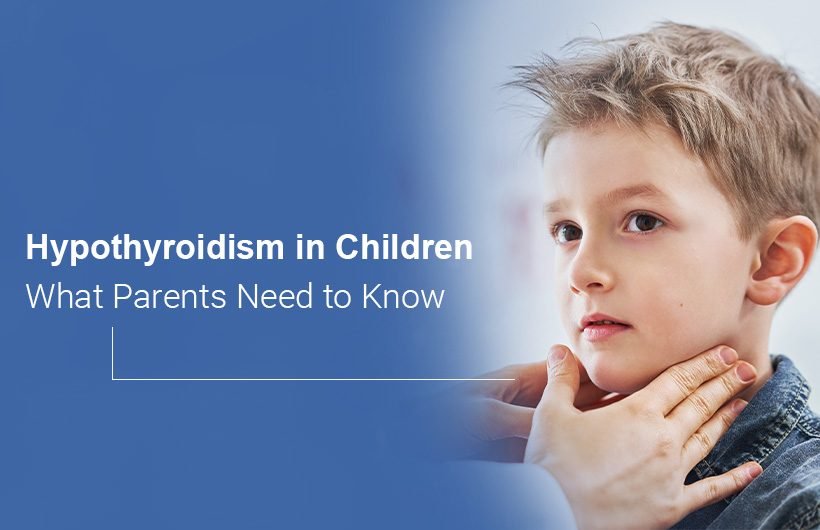Hypothyroidism in children refers to an underactive thyroid gland that fails to produce enough hormones. The medical condition of the thyroid gland primarily affects adults, yet children can also suffer from this disease even at birth. The thyroid gland functions essentially for three crucial processes, including the development of the brain and body growth and metabolic functions in children. Low hormone levels influence the development of almost every aspect of their growth. The starting point to treat childhood thyroid conditions, along with securing long-term health for your child is understanding this condition properly.
What is Hypothyroidism in Children?
Children afflicted with hypothyroidism experience thyroid glands unable to generate sufficient levels of thyroid hormones. The body needs thyroid hormones to enable normal growth and properly function the brain as well as to support development across all stages. Children develop two different variants of hypothyroidism, with congenital hypothyroidism appearing at birth, identified through newborn screening tests and acquired hypothyroidism developing in later childhood or adolescent periods. The two condition types need specialised medical care to prevent serious medical consequences.
Causes of Pediatric Hypothyroidism
There are several causes of hypothyroidism in children:
- Hereditary flaws produce destructive effects on the thyroid gland’s development and functionality.
- Hashimoto’s thyroiditis, along with other autoimmune disorders, triggers an attack on the thyroid gland.
- The lack of iodine in population diets interferes with thyroid hormone production, but this condition is uncommon in developed nations.
- The thyroid function might become compromised by taking lithium and several other medical drugs.
Children with thyroid symptoms must visit Dr. Moxit Shah because his specialised expertise enables correct diagnoses and individualised treatment plans.
Common Signs and Symptoms of Hypothyroidism in Kids
Symptoms of hypothyroidism in kids might be difficult to detect yet they tend to develop into more noticeable symptoms as time passes. Common signs include:
- Slow growth or delayed puberty
- Fatigue and lack of energy
- Dry skin and frequent constipation
The combination of poor attention and declining academic achievement represents two main symptoms of hypothyroidism in children.
- Unexplained weight gain.
- Swelling or fullness in the neck area (goiter).
An early detection of these warning signs, together with receiving medical guidance, leads to more effective treatment results.
How It’s Diagnosed
Diagnosing hypothyroidism in children involves both a physical check-up and lab tests. A pediatrician usually recommends blood tests to measure TSH (thyroid-stimulating hormone) and T4 (thyroxine) levels. If TSH is high and T4 is low, it often indicates hypothyroidism. In cases of acquired or congenital hypothyroidism, doctors closely monitor the child’s condition and perform regular tests to ensure proper treatment and development.
Endocrinologist in Ahmedabad, Dr. Moxit Shah emphasises that early detection of hypothyroidism is key—it helps support a child’s healthy growth and ensures better long-term well-being.
Hypothyroidism Treatment for Kids
Treatment for hypothyroidism in children usually involves a daily dose of levothyroxine, a synthetic hormone that replaces the one their thyroid isn’t making enough of. Since children grow and change quickly, their medication needs regular adjustments. That’s why ongoing check-ups and blood tests are important to make sure the dosage stays just right.
Some children may need treatment for only a short time, while others—especially those with congenital hypothyroidism—might need long-term care. Under the expert guidance of Dr. Moxit Shah, children receive the support they need to manage the condition effectively and lead healthy, active lives.
Impact on Growth & Development
If hypothyroidism in children isn’t treated, it can seriously affect their growth and brain development. Without proper thyroid hormone levels, kids may experience slow physical growth, learning difficulties, and even emotional or behavioural changes.
The good news is that with early diagnosis and regular treatment, most children recover well and continue to grow and develop normally. According to Dr. Moxit Shah, catching the condition early gives children the best chance for healthy growth and helps prevent long-term health issues.
When to See a Doctor
People should take their child to see a doctor when their youngster shows symptoms, including abnormal fatigue levels or unexpected weight increase or delayed puberty development. In case of any detected neck area swelling, medical attention should be sought immediately. Getting medical examinations regularly proves essential for patients who report thyroid diseases in their families.
According to Dr. Moxit Shah, your child will experience better developmental outcomes and prevent more severe childhood thyroid health problems through proactive healthcare monitoring.
Conclusion
Proper medical intervention allows children to control hypothyroidism since it constitutes a condition that remains manageable with appropriate treatment. Parents can help their children succeed by observing symptoms, obtaining prompt diagnosis and adhering strictly to medical treatment protocols. Patients need to visit their pediatric endocrinologist, Dr. Moxit Shah, regularly to achieve lasting results.






